Sustainability at Studierendenwerk Heidelberg
At Studierendenwerk Heidelberg, sustainability is a guiding principle throughout our organisation and an integral part of our corporate strategy. In accordance with the United Nations (UN), Studierendenwerk Heidelberg represents a comprehensive understanding of sustainability, focusing on all three pillars of sustainability (economic, ecological, social). Our commitment applies to all categories of the UN's Greenhouse Gas Protocol and consequently also to Scope 3 emissions, which many companies prefer to exclude and which, in the case of Studierendenwerk, are primarily generated by suppliers. We are committed to the responsibility of our product and service selection and are constantly optimizing our catalog of upstream emission sources with great attention to detail.
Not only is our understanding of sustainability comprehensive, the same applies to our approach: we have climate protection and sustainability guidelines, we determine and monitor our emissions, we define our targets with an action plan and report transparently and comprehensively in our annual sustainability reporting.
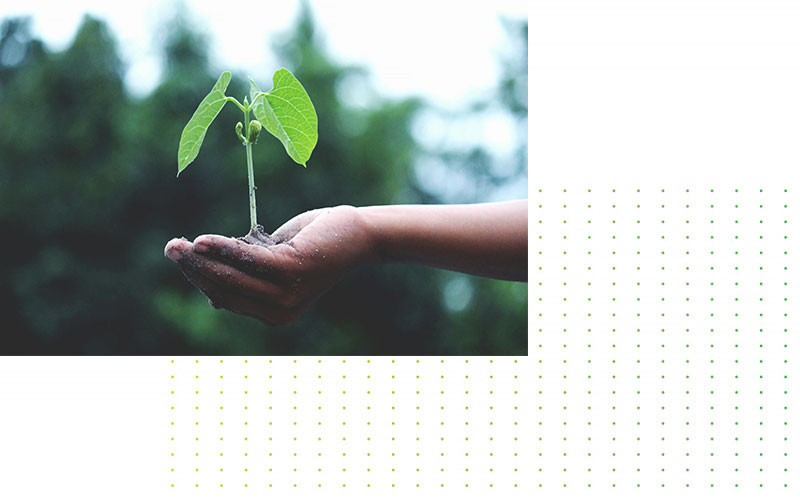
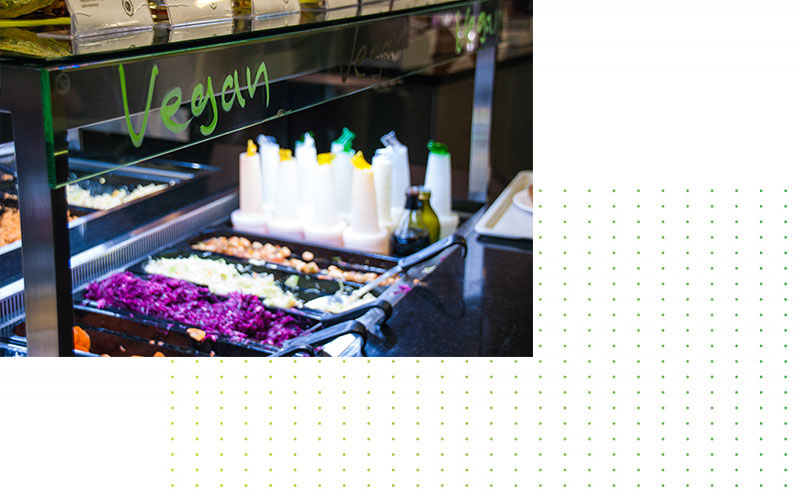
Plant-based, regional and fresh - the cuisine of tomorrow
With up to 10,000 meals sold per day in our 19 dining facilities, the products used in our canteens and cafés account for a significant share of Studierendenwerk's emissions. Our facilities' sustainability portfolio is in a constant process of improvement and can already demonstrate several achievements: Coffee products are only available in organic quality and fair trade, our pasta comes from our in-house pasta production facility, fresh meat is always at least husbandry type 3, and the average proportion of meat per plate sold is now only slightly over 10 per cent due to immense changes to the product range. With free-range eggs, a comprehensive reusable container system and an ever-increasing emphasis on regional and vegetarian options, Studierendenwerk Heidelberg is setting standards in sustainable food service throughout Germany.
Mensa 2.0 Pilot Project
As sustainable as possible at affordable prices - this is the new philosophy behind the completely redesigned canteen at Heilbronn Bildungscampus. The share of regional, seasonal, fair-trade, low-carbon and animal welfare-orientated products has been systematically expanded as far as possible in a project that is unique in Germany. This project is supported by the Dieter Schwarz Foundation and has removed climate-damaging products from the range and reduced fish and meat dishes by 75 per cent. Ready-made products have either been cancelled without substitution or replaced by self-produced items - fresh food is now part of everyday life. Drinks are now only available in glasses, meat is only available with a minimum standard of husbandry form 3, home-made organic pasta has been given its own buffet and the customer approach is also state-of-the-art - digital, multilingual and visually appealing, including combination suggestions for the buffet. The transformation was met with an extremely positive response from visitors and should be seen as a pilot project: This is because it is to be transferred to all of the Studierendenwerk's canteens in order to make them fit for the future and harmonise them with the corporate philosophy with a modern orientation. Implementation is currently underway in the Zeughaus canteen, on the Sontheim campus and the Triplex canteen, with the Zentralmensa to follow.
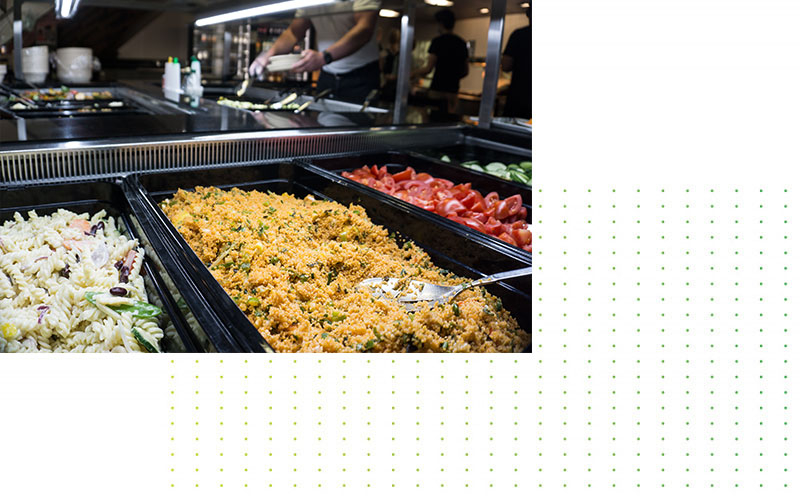
Want to learn more?
Modernisation - our speciality
Affordable housing is not only our obligation, it should be a fundamental right for students. We don't just want to offer rooms and a roof over your head, we want to create sustainable living spaces that offer room for development and personal growth. Whether urban gardening on more than 150m², an energy standard for new buildings of KfW 40, annual energy refurbishments totalling several million euros: the emissions of our facility management are being reduced each year at a measurable and rapid pace. We are not only fulfilling our obligations, but we are also tackling what else is possible, as the example below illustrates.
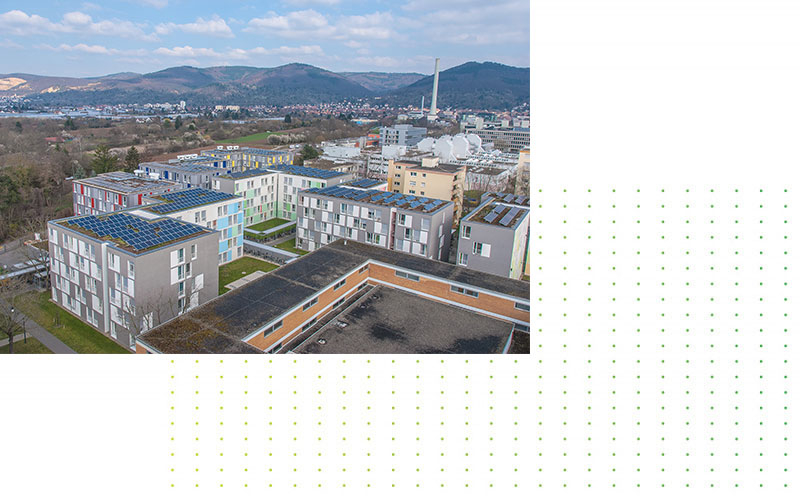

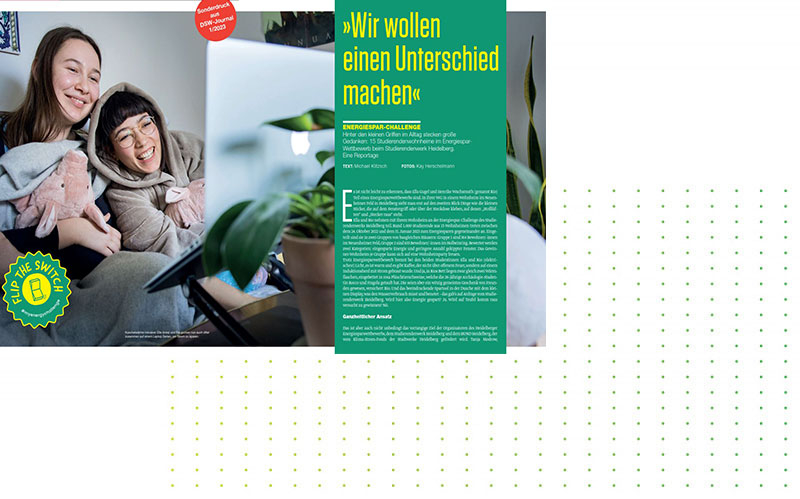
Saving energy – the right way
A competition among 15 halls of residence
1000 students from a total of 15 halls of residence: with the challenge that took place over the winter semester 22/23, the Studierendenwerk Heidelberg launched the largest energy-saving competitions that Heidelberg has ever seen. The prize was a party hosted in the halls of residence, which, like the entire project, was subsidised by the Stadtwerke's Klima Strom Fund. With an awareness campaign by BUND, two other accompanying sustainability campaigns and a new student tutor programme set up by Studierendenwerk with 23 students, the focus was consistently on maximum impact - which paid off with results that exceeded all expectations. For example, the hall of residence complex in Holbeinring with over 600 residents saved an average of 20 per cent of energy compared to the previous year. Expert estimates in the run-up to the competitions reckoned with 10 per cent at best. The success was primarily due to the preliminary conceptual work: the residents were informed weekly about their current status in the challenge, they were provided with tips and background information on saving energy, took part in events, were able to go on a trip to the Klimaarena and received intensive media coverage throughout the competition. Be it in the DSW-Journal, the Rhein-Neckar-Zeitung or SWR, the competition was widely publicised and regularly featured. SWR even presented the campaign in a six-part TV report, which was aired in the evening news at prime time.
Here's a montage of the TV feature:
Want to learn more?
Environmental Protection with Children? Of course!
From expired bandages and plastic packaging to egg cartons and misprints, pretty much everything can be recycled using an arts-based educational approach. The approximately 270 children cared for in our daycare centres are taught in a playful way at a very early age about the importance of environmental protection and resource conservation, for example through water cycles, visits to the beekeeper or by growing their own fruit and vegetables, which also make it onto the plates in the daycare centre after being harvested by the children. The following example from our daycare centre in Humboldtstraße shows how sustainability can also be realised outside of the home and food service sector.
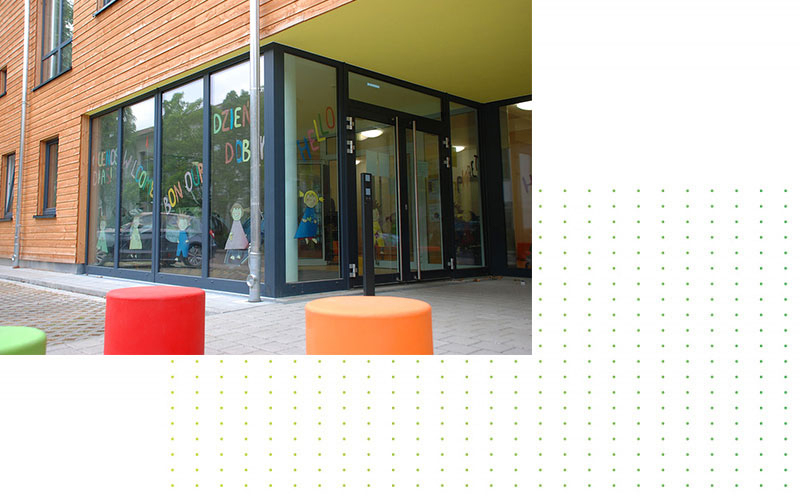
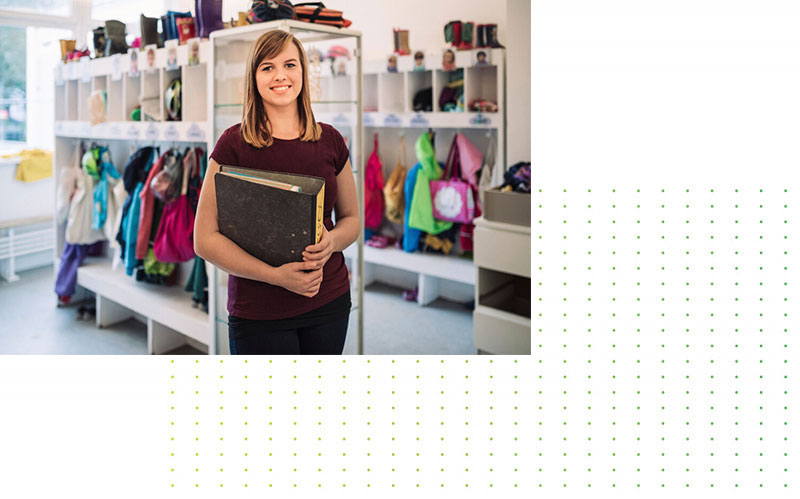
Sustainable Business Project
Sustainability and climate change have long played a major role in the pedagogy and early childhood education of our daycare centres, and the employees were therefore very enthusiastic when they were able to take part in the ‘Sustainable Management’ showcase project organised by the city of Heidelberg. Our daycare centre at Humboldstr. 17 was put to the test with several site inspections by recognised experts: Do we comply with all relevant standards, how high is our electricity and energy consumption and how many emissions are caused annually by our use of wind power, for example? A complete carbon footprint drawn up specifically for the daycare centre clearly showed that 75 percent of the emissions fall under Scope 3, which means that they are indirect emissions along the value chain. Half (!) of this is due to commuter traffic, which clearly emphasised our need for action in terms of mobility. As a result, we started to introduce a company mobility management system and thus set the course for systematically analysing untapped potential and subsequently deriving measures that would benefit our employees while also reducing emissions. As the second most important emission factor is our electricity consumption, the ventilation system was quickly optimised and a review was initiated to see whether the roof of the daycare centre could be equipped with a photovoltaic system. Studierendenwerk Heidelberg has already received an award, and future carbon footprints will prove the success of our changes in real figures.
Ihr wollt noch mehr wissen?
Diverse Klientel, diverse Dienstleistungen
Die Beratung zur Studienfinanzierung wie dem BAföG, eine Psychosoziale Beratungsstelle (PBS), eine Rechts- und Sozialberatung für Studierende, kulturelle Events und zwei ServiceCenter als zentrale Anlaufstelle für alles rund um den Studienalltag –das Studierendenwerk Heidelberg bietet eine ganze Reihe an Dienstleistungen für Studierende, die das Studierendenleben erheblich erleichtern und eine Konzentration auf das Studium teilweise überhaupt erst ermöglichen. Die Printprodukte des Studierendenwerks sind selbstverständlich alle aus Recycling-Papier, an der Einführung einer elektronischen Akte wird gearbeitet und zur Förderung der Vielfalt wurde erst neulich ein Diversity-Referat für Menschen der LGBTQIA+ Community eingeführt.
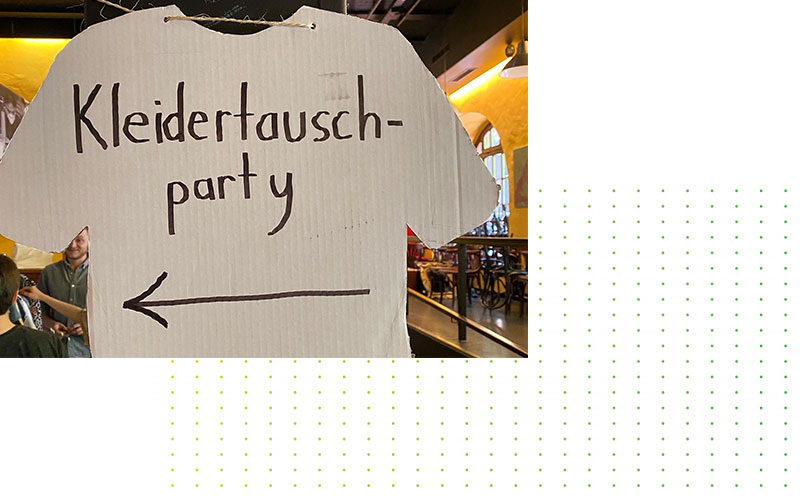
Maike Schlindwein
Klimaschutz- und Nachhaltigkeitsmanagerin
Marstallhof 1, 69117 Heidelberg
Tel.: 06221 54-2632